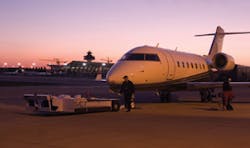IAD's New Bizav Complex
From the outside, one might expect to find a Stealth fighter inside — such is the facade of the new Dulles Jet Center, a $60 million corporate hangar complex at Washington Dulles International Airport. It is the third fixed base operation at IAD, along with Landmark Aviation and Signature Flight Support. The latter will provide refueling services under contract with Dulles Jet Center, at least for the short term. The new FBO grew out of a local builder's need for hangaring — such is the market that is our nation's capital. With Reagan National in effect off limits to business aviation, Dulles is a hot market. DSJ officials project that their corporate hangars will be completely leased out by mid-2007.
The Dulles Jet Center owner is Nathan Landow and his sons, David and Michael. Landow is a builder and developer of high-rise office buildings and apartments in the Washington market through his firm Landow & Company, based in Bethesda, MD. In his search to find adequate facilities to house his G200 business jet at Dulles International he discovered that the FBOs were full. Subsequent discussions with the Metropolitan Washington Airports Authority (MWAA), the IAD sponsor, led to Landow subleasing a 20-acre site that was part of the Signature leasehold.
During a post-Thanksgiving press unveiling, Landow continually stressed the need for corporate tenants to feel vested in the facility, with associated storage and office space part of the package. It is, Landow says, a "private aircraft jet center" — he loathes the term 'fixed base operation.'
The complex is in line with other new business aviation developments in various other hot corporate markets — California, Arizona, and Florida. The concept: provide the corporate hangar ownership experience under a multiple-bay umbrella, with the FBO or property manager providing related services.
A significant difference at the Dulles Jet Center is the agreement with Signature Flight Support for refueling services.
A 20-acre Leasehold
"Based on our experience," explains Nathan Landow, "we knew there was demand here for space ... and high-end demand."
Signature Flight Support had a 20-acre parcel that remained undeveloped, and a supplemental lease was agreed to with Landow. Part of the arrangement is that Signature provides the refueling services for the duration of its existing lease with MWAA. According to Landow, Dulles Jet Center has another 30-year lease agreement with the authority for the property, beyond the Signature sublease.
While Signature provides refueling, Dulles Jet Center sees an opportunity with overnight parking on its vast 400,000-square foot ramp. Landow comments that Signature Flight Support reports that as much as 40 percent of its transient traffic does not purchase fuel; he sees those aircraft as potential overnight customers.
Christopher Browne, vice president and airport manager of Dulles International, says he welcomes the FBO and, in particular, the additional business aviation ramp space. "Actually, at Dulles we're short of pavement," he comments.
The location at the entrance to Dulles International will help keep the business aviation sector and airline passenger activity independent of each other, says Browne.
160,000 Square Feet of Hangar Space
According to a Dulles Jet Center press release, "Valued at more than $60 million, [DSJ] is the first flight service center here to offer modern, efficient hangar space with easy access to more than 400,000 square feet of ramp area and ten-minute takeoffs, with a holding area 300 feet away." It has location.
It also has hangar space — four 40,000-square foot hangars, attached to a 25,000-square foot, three-story FBO facility that features granite floors and loft ceilings.
At the time of the press unveiling, Dulles Jet Center reported that it had 75 percent of its corporate hangar space leased by 21 tenants — operators of 16 large and medium-sized business jets. According to David Landow, some 65 percent of the space was pre-leased before construction was complete.
The hangars feature specially designed tilt-up, cantilevered doors for quiet, unobstructed, and quick opening and closing. Minnesota-based Door Engineering was the designer. Each hangar has two 120-foot wide doors, 30 feet high, that are raised and lowered by 27,000-pound concrete blocks.
Executive office space is available for lease, along with maintenance shops attached to each corporate hangar. The intent is to offer a self-contained corporate experience, says Landow.
Fueling Agreement
According to Nathan Landow, the arrangement with Signature is for retail and based-tenant refueling. Tenants are provided based-aircraft fuel discounts from Signature, he says. And the Dulles Jet Center receives "a small commission" off fuel revenues.
According to MWAA's Browne, the airport owns the fuel farm and it is operated under management contract with AirBP. Airlines, FBOs, and corporates purchase their own fuel and comingle it.
Nathan Landow says that the agreement with Signature runs for several years. At that time, he expects that MWAA will put out a request for proposals for interested parties on the refueling rights. When that occurs, he says, "we would certainly take a serious look at it."
Landow adds that he was also approached by Signature on another corporate-related development at Teterboro (NJ) Airport, but nothing materialized.
He leaves the door open to other possible developments in corporate aviation, now that his firm has completed its first such venture.
